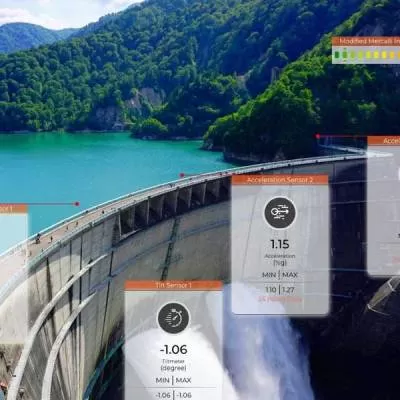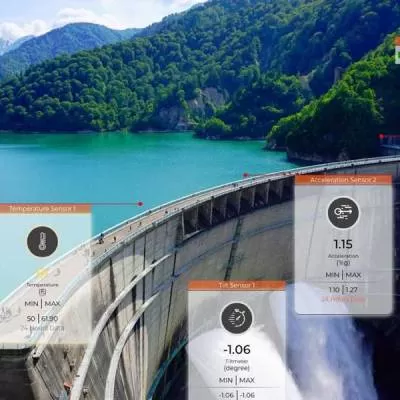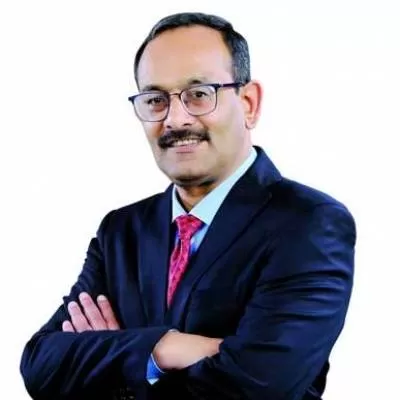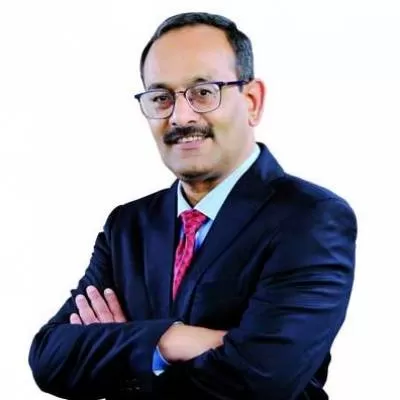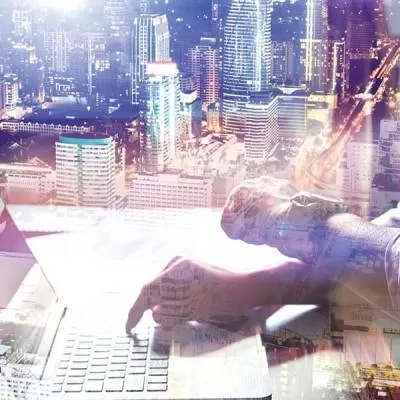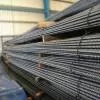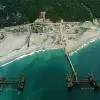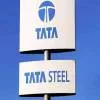- Home
- Technology
- One success factor of Indian companies in France is their cost-competitive approach.
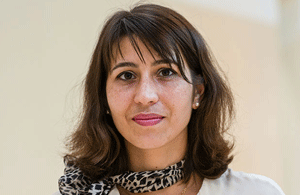
One success factor of Indian companies in France is their cost-competitive approach.
India has emerged as one of the most attractive countries for investors from France with their investments developing strongly on a long-term perspective. The bilateral trade between both countries stood at about Ç7 billion ($9 billion) at the end of 2013.
Acting as a liaison for over 600 French companies in their exploration of the Indian market is Sophie Clavelier, Head of Infrastructure Transport Industry Department for South Asia, Ubifrance and the Trade Commission based in the French Embassy in New Delhi. Further, working to develop bilateral business ties is Matthieu Lefort, Trade Commissioner, Consulate General of France, Mumbai, who came to India two years ago. Prior to this, he was posted in Hong Kong and Taiwan. Clavelier and Lefort elaborate upon the India-France relationship in conversation with SHRIYAL SETHUMADHAVAN.
What are the challenges in the Indo-French bilateral relations in the present day?
Lefort: India is a developing market. It is competitive and price-sensitive, and hence one has to be competitive as well to be able to grow here. Also, there are several opportunities, but the decision-making process is lengthier as compared to other markets. Hence, the RoI will take longer as well. Specifics in India's regulation make it a market of its own and adapting to those specific facts is most important. This is one huge and interesting market, but one needs to dedicate time to build on ideas here.
What emphasis does France place on India as a trade partner?
Clavelier: Seven hundred and fifty French companies 350 companies and 400 subsidiaries are established in India today. And numerous French investments, such as Accor, Carrefour, Danone, Michelin, Renault, Sanofi, Seb, etc, are at the starting or growth phase at present. The stock of investments made by French companies in India totals a little over $17 billion. This figure places France among the largest foreign investors in India.
What is the current engagement level between India and France in the building, construction and infrastructure sectors?
Clavelier: One successful partnership between our two countries is in the urban transport sector. This is where I see the biggest scope for mutual projects in metros, tramways, etc over the next 5 to 10 years. Certainly, the French presence in India is crucial in the infrastructure sector. In the construction and engineering sector per se, we can account for companies such as Vinci Construction (Eurovia), Ameco, Outinord SAS, Lafarge, Vicat, etc. Even SMEs are keen to explore the Indian market. They are interested in working on technology-oriented projects as they have both the technology and the knowhow to work in difficult terrains and/or on new construction methods. The French presence is well established in the railway and urban transport sector as well; all major groups (Alstom, Thales, RATP, SNCF, Metro One, Veolia Transport) and renowned SMEs (Vossloh Cogifer, Egis Rail, Corex, Faiveley, Railtech, etc) have opened subsidiaries or work through partnerships in India. They are working on various metro projects in Tier-I cities Delhi, Mumbai, Bengaluru, Hyderabad, Chennai and Kolkata and Tier-II cities. Other well-known companies such as Vinci, Safege and Lumiplan work in the field of urban planning or restructuring and smart cities.
Where do you see major opportunities for French companies in India?
Clavelier: The rail equipment and urban mobility space is one area where there is great possibility of increasing collaboration between India and France. The Indian Railway Equipment Exhibition 2013, partnered by the Ministry of Railways (of India), held in New Delhi saw the French Trade Commissions-UBIFRANCE India welcoming six leading companies from France to showcase their expertise and state-of-the-art technologies. The French presence included PVI, Dubois, Certifer, Minerva, Bureau Veritas and Forest Line. Similarly, at the Urban Mobility India 2012 Conference Cum Exhibition in New Delhi, which was organised by the Indian Institute of Urban Technology under the aegis of the Ministry of Urban Development, we had 14 leading companies from France like Alstom Transport, Certifer, Deny Fontaine, Egis Rail, Eurailtest, Eurovia, Forest-Line, IDMS, Lumiplan, Scoma, Visionor, Vossloh Cogifer and Yellow Window Consultants showcasing their expertise and state-of-the-art technologies in the fields of urban mobility. We have also conducted technical roundtables on themes like 'answering to the expectations of tomorrow's passengers (signalling, communication, comfort and safety)', 'development of the urban and railway networks in the eastern states of India', and 'transport and technologies'. Lefort: Also, hospitality is a huge market for us. This is a liberalised market and we see a lot of opportunities in this sector.
Please highlight some important projects that India and France are currently eyeing. Clavelier: French participation in metro projects like Delhi (all phases), Bengaluru (Phase-II the French Development Agency is financing part of the project), Mumbai (Line-1), Hyderabad (Phase-I) and Kochi is strong in various ways.
What are the areas where Indian construction or infrastructure companies have a role to play in your country?
Clavelier: France is now home to nearly 100 Indian companies, which employ over 5,000 people. In 2011, India was the 13th largest foreign investor in France by project numbers. Half of all Indian investment projects were in the software and IT services sector. Indian investments in France are mostly in R&D, engineering and design projects (38 per cent of all Indian investments in 2013). Then, there are investments in production or manufacturing and business-to-business services (25 per cent each).
Any success stories of Indian companies that are growing and doing profitable business in France?
Clavelier: Among others, Larsen & Toubro Ltd is one company that is trying to develop business in Europe. Then you have Tata Steel France Rail, which is into production of rails for the TGV High Speed Train (300,000 tonne per year).
Lefort: One of the key success factors of Indian companies in France is their cost-competitive nature. Indian companies are highly efficient in developing new processes and reducing the project's production and maintenance cost. This is something France requires and French companies learn in India.
What is the support you offer to companies investing in both countries?
Lefort: Our trade commission is more focussed on inbound than outbound. As trade commissioners, we provide information about the Indian market to French companies so they understand the opportunities and identify the right partners. For outbound, we have the sister French government body called IFA (Investment French Agency) that acts as a contact window and helps Indian companies willing to do business in France.
Do you expect the new Indian Government to have an impact on bilateral trade relations?
Lefort: Our expectations are very high. The new Government is definitely here to improve the economic situation and that is really good because it has already taken some measures to increase growth and strengthen investment. So it is very good for us and we are very confident that our relationship commercial and bilateral will grow further. Also, there is a strong willingness by the Government to improve infrastructure. That is very important for us.
Vital stats
- France is now home to nearly 100 Indian companies, which employ over 5,000 people.
- Seven hundred and fifty French companies 350 companies and 400 subsidiaries are established in India today.
- The bilateral trade between both countries stood at about Ç7 billion ($9 billion) at the end of 2013.
- Matthieu Lefort
- Consulate General
- France
- Mumbai
- Sophie Clavelier
- Infrastructure Transport Industry
- Infrastructure
- Transport
- French Embassy
- Accor
- Carrefour
- Danone
- Michelin
- Renault
- Sanofi
- Seb
- Vinci Construction
- Ameco
- Outinord SAS
- Lafarge
- Vicat
- Alstom
- Thales
- RATP
- SNCF
- Metro
- Veolia
- Vossloh Cogifer
- Egis Rail
- Corex
- Faiveley
- Railtech
- Railways
- PVI
- Dubois
- Certifer
- Minerv
Matthieu Lefort, Trade Commissioner, Consulate General of France, Mumbai India has emerged as one of the most attractive countries for investors from France with their investments developing strongly on a long-term perspective. The bilateral trade between both countries stood at about Ç7 billion ($9 billion) at the end of 2013. Acting as a liaison for over 600 French companies in their exploration of the Indian market is Sophie Clavelier, Head of Infrastructure Transport Industry Department for South Asia, Ubifrance and the Trade Commission based in the French Embassy in New Delhi. Further, working to develop bilateral business ties is Matthieu Lefort, Trade Commissioner, Consulate General of France, Mumbai, who came to India two years ago. Prior to this, he was posted in Hong Kong and Taiwan. Clavelier and Lefort elaborate upon the India-France relationship in conversation with SHRIYAL SETHUMADHAVAN. What are the challenges in the Indo-French bilateral relations in the present day? Lefort: India is a developing market. It is competitive and price-sensitive, and hence one has to be competitive as well to be able to grow here. Also, there are several opportunities, but the decision-making process is lengthier as compared to other markets. Hence, the RoI will take longer as well. Specifics in India's regulation make it a market of its own and adapting to those specific facts is most important. This is one huge and interesting market, but one needs to dedicate time to build on ideas here. What emphasis does France place on India as a trade partner? Clavelier: Seven hundred and fifty French companies 350 companies and 400 subsidiaries are established in India today. And numerous French investments, such as Accor, Carrefour, Danone, Michelin, Renault, Sanofi, Seb, etc, are at the starting or growth phase at present. The stock of investments made by French companies in India totals a little over $17 billion. This figure places France among the largest foreign investors in India. What is the current engagement level between India and France in the building, construction and infrastructure sectors? Clavelier: One successful partnership between our two countries is in the urban transport sector. This is where I see the biggest scope for mutual projects in metros, tramways, etc over the next 5 to 10 years. Certainly, the French presence in India is crucial in the infrastructure sector. In the construction and engineering sector per se, we can account for companies such as Vinci Construction (Eurovia), Ameco, Outinord SAS, Lafarge, Vicat, etc. Even SMEs are keen to explore the Indian market. They are interested in working on technology-oriented projects as they have both the technology and the knowhow to work in difficult terrains and/or on new construction methods. The French presence is well established in the railway and urban transport sector as well; all major groups (Alstom, Thales, RATP, SNCF, Metro One, Veolia Transport) and renowned SMEs (Vossloh Cogifer, Egis Rail, Corex, Faiveley, Railtech, etc) have opened subsidiaries or work through partnerships in India. They are working on various metro projects in Tier-I cities Delhi, Mumbai, Bengaluru, Hyderabad, Chennai and Kolkata and Tier-II cities. Other well-known companies such as Vinci, Safege and Lumiplan work in the field of urban planning or restructuring and smart cities. Where do you see major opportunities for French companies in India? Clavelier: The rail equipment and urban mobility space is one area where there is great possibility of increasing collaboration between India and France. The Indian Railway Equipment Exhibition 2013, partnered by the Ministry of Railways (of India), held in New Delhi saw the French Trade Commissions-UBIFRANCE India welcoming six leading companies from France to showcase their expertise and state-of-the-art technologies. The French presence included PVI, Dubois, Certifer, Minerva, Bureau Veritas and Forest Line. Similarly, at the Urban Mobility India 2012 Conference Cum Exhibition in New Delhi, which was organised by the Indian Institute of Urban Technology under the aegis of the Ministry of Urban Development, we had 14 leading companies from France like Alstom Transport, Certifer, Deny Fontaine, Egis Rail, Eurailtest, Eurovia, Forest-Line, IDMS, Lumiplan, Scoma, Visionor, Vossloh Cogifer and Yellow Window Consultants showcasing their expertise and state-of-the-art technologies in the fields of urban mobility. We have also conducted technical roundtables on themes like 'answering to the expectations of tomorrow's passengers (signalling, communication, comfort and safety)', 'development of the urban and railway networks in the eastern states of India', and 'transport and technologies'. Lefort: Also, hospitality is a huge market for us. This is a liberalised market and we see a lot of opportunities in this sector. Please highlight some important projects that India and France are currently eyeing. Clavelier: French participation in metro projects like Delhi (all phases), Bengaluru (Phase-II the French Development Agency is financing part of the project), Mumbai (Line-1), Hyderabad (Phase-I) and Kochi is strong in various ways. What are the areas where Indian construction or infrastructure companies have a role to play in your country? Clavelier: France is now home to nearly 100 Indian companies, which employ over 5,000 people. In 2011, India was the 13th largest foreign investor in France by project numbers. Half of all Indian investment projects were in the software and IT services sector. Indian investments in France are mostly in R&D, engineering and design projects (38 per cent of all Indian investments in 2013). Then, there are investments in production or manufacturing and business-to-business services (25 per cent each). Any success stories of Indian companies that are growing and doing profitable business in France? Clavelier: Among others, Larsen & Toubro Ltd is one company that is trying to develop business in Europe. Then you have Tata Steel France Rail, which is into production of rails for the TGV High Speed Train (300,000 tonne per year). Lefort: One of the key success factors of Indian companies in France is their cost-competitive nature. Indian companies are highly efficient in developing new processes and reducing the project's production and maintenance cost. This is something France requires and French companies learn in India. What is the support you offer to companies investing in both countries? Lefort: Our trade commission is more focussed on inbound than outbound. As trade commissioners, we provide information about the Indian market to French companies so they understand the opportunities and identify the right partners. For outbound, we have the sister French government body called IFA (Investment French Agency) that acts as a contact window and helps Indian companies willing to do business in France. Do you expect the new Indian Government to have an impact on bilateral trade relations? Lefort: Our expectations are very high. The new Government is definitely here to improve the economic situation and that is really good because it has already taken some measures to increase growth and strengthen investment. So it is very good for us and we are very confident that our relationship commercial and bilateral will grow further. Also, there is a strong willingness by the Government to improve infrastructure. That is very important for us. Vital stats France is now home to nearly 100 Indian companies, which employ over 5,000 people. Seven hundred and fifty French companies 350 companies and 400 subsidiaries are established in India today. The bilateral trade between both countries stood at about Ç7 billion ($9 billion) at the end of 2013.


